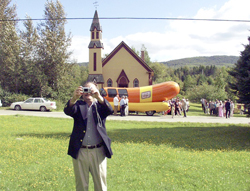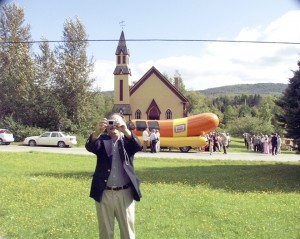

by Joseph Gresser
STANNARD — The new agricultural businesses that have flourished in the Northeast Kingdom over the past decade could not have grown so quickly without capital. Many of the necessary resources were found by Rian Fried, a pioneer in the field of socially responsible investing who preferred to work quietly behind the scenes.
He was 65 years old when he died after a brief illness on July 3.
Rian, who I had the pleasure of knowing and with whom I served as selectman for many years, was instrumental in the success of many of the signature ventures of the Northeast Kingdom’s burgeoning agricultural renaissance.
I don’t remember when I first met Rian. I do recall the first time I met Rachel Hexter, his wife. That was the day I moved to Stannard about 40 years ago, when she was Town Clerk.
She left that job and went to work for the Orleans County Council of Social Agencies (OCCSA), an anti-poverty agency from the days when the federal government thought it could do something to help people who were struggling economically.
Rian also worked at OCCSA, an agency with an operatic history, and he turned up in Stannard one day. OCCSA, whose director went out of his way to aggravate the powers that be, did not last much longer and Rachel and Rian went south to the Boston area. He to get a master’s degree at the Kennedy Center for Government at Harvard and she to study law.
Rian ran an economic development agency in Brockton, Massachusetts, while he waited for Rachel to finish her schooling. Wherever he set up his office after that he brought with him framed photographs of boxer Marvin Hagler, who hailed from Brockton and was undisputed middleweight champion of the world for seven years, including the time Rian spent in his hometown.
Soon after Rachel and Rian came home, he met Doug Fleer and the two took their mutual interest in stock trading and created a small investment company headquartered in an upstairs room at the house in Stannard.
In the early 1980s a dial-up connection was good enough to keep a couple of traders afloat, and they had the luxury of a dedicated telephone line. Their specialty was what they called “ethical investing.”
Like any investment firm, Rian and Doug would check out companies to see if they were well run and were likely to make money. Unlike almost any other firm, they also applied what they called social screens.
That is, they would see if a company produced armaments, did business with South Africa or discriminated against women or minorities. Those companies were excluded from consideration no matter how profitable they might seem.
Nowadays that is called socially responsible investing and it is big business. Even conventional mutual funds often have a socially responsible fund as one of their options.
In those days the two partners had to explain what they were doing to skeptical reporters and brokers who thought it strange to leave even dirty money on the table.
Rian and Doug were looking at the long term, and said an ethical company would not be as liable to lawsuits, strikes or other problems as unethical companies, and would eventually outperform them. They also weren’t looking to get rich quickly.
I often found myself drifting over to their headquarters, which had some of the qualities of a tree house, only with a lot more paper. At some point, Rian asked me to start writing editorials for their newsletter, a loss leader they called The Clean Yield.
Rian was a hard editor, but it was fun to write for the newsletter, and I really enjoyed the checks.
The newsletter became so successful that the company took its name. It also outgrew the tree house and moved into downtown Greensboro.
Rian liked the Greensboro office, but was faced with a problem. Clean Yield needed broadband Internet service to make its trades and none was available. As an old community organizer he knew what to do, and got together a group of people who shared his need.
They combined resources and brought a high-capacity line into Greensboro. The engineers set up an antenna that beamed a signal to a tower in Stannard that reflected it back to Greensboro.
It wasn’t long after that Verizon noticed that Greensboro had its own broadband service and brought a DSL connection to the town.
About 15 years ago Rian was diagnosed with non-Hodgkin lymphoma, a serious form of blood cancer. After a great deal of research he decided to seek treatment in Seattle, Washington, at the Fred Hutchinson Cancer Research Center.
He received a bone marrow transplant, a harrowing procedure that was fatal to most of those who began treatment at the same time as Rian.
After that Rian spend countless hours talking with people who were in the same situation, answering questions, helping them to understand their options and calming their fears. So quiet was his generosity that I only learned after his death that he had spent hours talking with my ex-wife, who remains a good friend, when her second husband faced a possible bone marrow transplant.
As the socially responsible investment movement grew, Rian saw new possibilities.
Tom Stearns, the founder of High Mowing Seeds, said “Rian for a long time realized that using money and investment to say ‘No’ to things like apartheid, armaments and discrimination was not the only possibility.” By finding ways to put money into businesses that shared his values, Rian found a way for people’s resources to say ‘Yes,’ Mr. Stearns said.
Before Ryan figured out a different way to do it, businesses that needed capital to expand had to become publically traded companies. Eventually those companies, like Ben and Jerry’s, faced irresistible pressure to sell the company to the highest bidder, regardless of the founders’ desires.
Mr. Stearns said that Rian figured out a way to allow his investors to put money into High Mowing while insulating the company from such pressures. He said the company recently started sending those investors big checks in repayment.
He said that Rian counseled and supported many of the other businesses in the Hardwick area.
One of those was Claire’s, a restaurant that was financed by selling shares to community members.
Its owner, Linda Ramsdell, said, “His passion and love for what we were trying to do there was invaluable and really special.”
She recalled his visits to the restaurant.
“It was always fun to see him in Claire’s. He was always having a good time, no matter who he was with.”
Rian’s enthusiasm also extended to his hometown. He was the chairman of the town’s planning commission for many years, a body on which I serve. I’ve stayed on the planning board through many rewrites of the zoning bylaws and the town plan, in large part because I enjoyed working with Rian.
He was a fount of information and a great talker. We shared a love for the blues and constantly tried to top each other with obscure knowledge.
I never succeeded in getting the better of him in those conversations or — if I’m honest — in any others.
When I told him about seeing the great blues harmonica player Junior Wells at a small Chicago club in the 1970s, Rian responded with the story about spending a strange evening with the musician at a long-ago party.
Rian, along with his nearest neighbor Jan Lewandoski, spent years trying to persuade Stannard residents Harold and Mavis Nunn to allow the Vermont Land Trust to have a preservation easement on their farm — one of the oldest in town.
Shortly after the documents were signed, the Nunns died. Today Tom Gilbert and his family live in the old farmhouse and are preparing to start growing vegetables and running a small school on the land.
Rian was recruited by Sterling College to serve as a trustee, an honor he cherished. When I saw him at Sandor Katz’s lecture there a few months ago, he regaled me with an enthusiastic account of a day-long strategy meeting he and his fellow trustees had just finished.
Most of all Rian was devoted to his family. He was happy beyond measure when his daughter Dorigen join Clean Yield. He told anyone who would listen that she was much better at the job than he was.
Rian was raised in Vienna, where his father was a diplomat. One of our odder connections was the discovery that we had the same high school principal, even though he went to school in Austria and I was in New York City.
He was the eldest of six brothers who, despite distance, remained extremely close.
After his bone marrow transplant Rian always said he was not going to live to be an old man. He regarded that as a simple fact and dismissed any attempt to dissuade him as wishful thinking.
In his business he had the same clear sightedness. Because he had moved into an area of investment that, in less ethical hands, could have been an invitation to fraud, Rian had to be punctilious about Securities and Exchange Commission regulations.
One of the reasons that so few other people ventured into his area of expertise was that most people were unwilling to invest the necessary hours of painstaking research.
Nevertheless, Tom Stearns recalled, Rian insisted that his investors were more radical than he and pushed him to find opportunities to put their money to work to create social change.
One of the last projects Rian was involved in was the Northeast Kingdom Tasting Center now taking shape on Main Street in Newport.
Its director, Eleanor Leger, said Rian was dubious at first, but eventually came around.
She said Rian asked insightful questions and “never let you think he was saying it was a terrible idea, even when he was.”
Rian’s investors made the difference between success and failure for the center, she said.
Even now, after knowing Rian for 30 years, I’m not sure whether his path from the anti-poverty programs of the 1970s to a twenty-first century program of creating new sustainable businesses through socially conscious investing was planned.
My guess is that it wasn’t, but that Rian, guided by his innate decency, found a path for others to follow.
contact Joseph Gresser at [email protected]
For more free articles from the Chronicle like this one, see our Featuring pages. For all the Chronicle’s stories, pick up a print copy or subscribe, either for print or digital editions.







